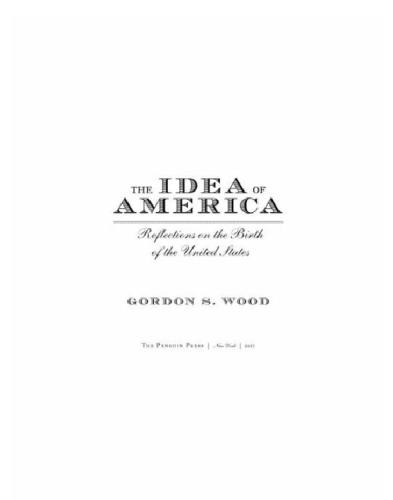
The Idea of America
Reflections on the Birth of the United States
کتاب های مرتبط
- اطلاعات
- نقد و بررسی
- دیدگاه کاربران
نقد و بررسی

Starred review from February 21, 2011
Pulitzer Prize–winning historian Wood challenges the popular view that the war for American independence was fought for practical and economic reasons, like unfair taxation. In this exceptional collection of essays (some previously published and others originating as lectures) he argues brilliantly to the contrary, that the Revolution was indeed fought over principles, such as liberty, republicanism, and equality. As he points out, Americans believed they alone had the virtues republicanism requires (such as simplicity and egalitarianism) and thus were supportive but skeptical of revolutions in France and Latin America. When joined to Protestant millennialism, Americans grew to believe that they were God's chosen people, with a mission to lead the world toward liberty and republican government, a view that Wood uses to explain America's continued attempts to create republics in places like Iraq and Afghanistan. This is a remarkable study of the key chapter of American history and its ongoing influence on American character.

April 1, 2011
A Pulitzer and Bancroft Prize–winning historian offers deeply contemplative essays from a career devoted to studying the Revolutionary Era.
If, as Wood (History/Brown Univ.; Empire of Liberty: A History of the Early Republic, 1789-1815, 2009, etc.) asserts, the Revolution "is the most important event in American history, bar none," it follows that arguments over its ideology, the doctrinal core of the nation's creation, become critical, not just to contemporary politicians and activists looking to the past for legitimacy, but even—and more regrettably—to generations of historians bent on imposing their own era's preoccupations. The author discloses his own methodology, of particular value to those interested in historiography, and also important to the general reader looking for reliable information about the nation's origins. Wood rejects the temptation to take sides among history's combatants. Rather, the historian's task, he writes, is to examine why they "thought and behaved as they did," understanding that ideas, while important, are subordinate to passions driving social change, that they are always constrained by the facts on the ground and frequently entail consequences that no one, not even their sponsors, could foresee. With these stipulations and with genuine modesty—in postscripts to most of these essays, Wood frequently offers second thoughts about pieces composed years ago—he covers such topics as the disconnect between the sometimes lurid rhetoric accompanying the more prosaic reality of the Revolution; the Founders' fascination with the rise and fall of Republican Rome; the unique radicalism shared by Jefferson and Tom Paine; the conspiratorial interpretation of events that flourished in the 18th century; the era's sincere fear of monarchism on the one hand, mob rule on the other; the ideal of disinterestedness versus the competing interests unleashed by messy democracy; the peculiar awkwardness of the republic's first decade; and the origins of our unique constitutionalism and our sometimes misguided political evangelism. It's difficult to conjure another writer so at home in the period, so prepared to translate its brilliant strangeness for a modern audience.
Sound, agenda-free analysis, gracefully presented.
(COPYRIGHT (2011) KIRKUS REVIEWS/NIELSEN BUSINESS MEDIA, INC. ALL RIGHTS RESERVED.)

April 1, 2011
Wood (Alva O. Way University Professor, Brown Univ.; The Radicalism of the American Revolution) has long pronounced the American Revolution to be the transformative event in U.S. history, one to which we continually return to "refresh and reaffirm our nationhood." Standing above the stark economic determinism of Progressive Era historians (e.g., Charles Beard) and the ideological determinist school characterized by Bernard Bailyn, Wood has devoted his prolific career to constructing a historical interpretation that combines all aspects of the American Revolution into a viable synthesis. Whether discussing the foundations of the American Constitution, the Revolutionary mentality, or the birth of modern American politics, these previously published essays and lectures represent the incredible range of this eminent scholar's contributions to the historiography of the Revolutionary era. Wood's introduction and conclusion encapsulate his themes, while his brief afterwords to each chapter note the evolution of his thought. VERDICT Intellectually expansive and elegantly woven, Wood's writings are the closest thing we have to an elegant mediation between today's readers and the founding generation. Required reading for Revolutionary War enthusiasts on all levels.--Brian Odom, Pelham P.L., AL
Copyright 2011 Library Journal, LLC Used with permission.

Starred review from April 15, 2011
Wood, currently professor of history at Brown University, has long been recognized as one of the preeminent historians of the era of the American Revolution. In this series of cogent, beautifully written essays, Wood repeats some of his familiar themes, but they are themes well worth revisiting. The elites of our revolutionary generation were products of the Enlightenment, so they were imbued with a spirit of optimism and faith in the power of reason to shape and improve their institutions. Some looked to the early Roman republic and hoped they could create a society driven by civic-minded citizen farmers. Yet their optimism was tempered by their awareness of human limitations and frailty. Could they forge a government that could be authoritative without being authoritarian? Would the efforts to maintain self-government over a vast area degenerate into mob rule or tyranny, as happened with the Romans? They were men acutely aware that they were operating in uncharted territory but united by the belief that the consent of the governed was a bedrock principle, and this superb collection should remind us how genuinely radical that concept was in the eighteenth century.(Reprinted with permission of Booklist, copyright 2011, American Library Association.)

























دیدگاه کاربران